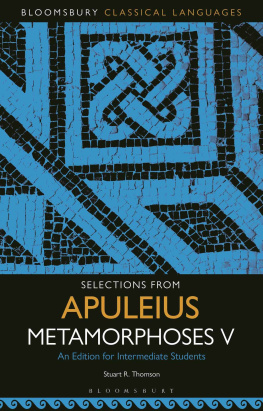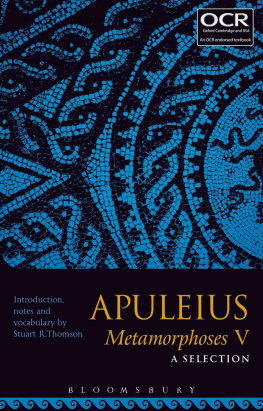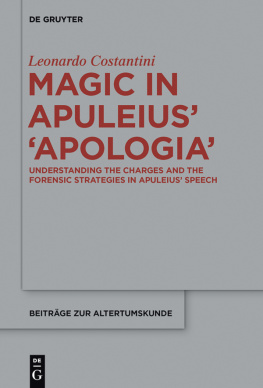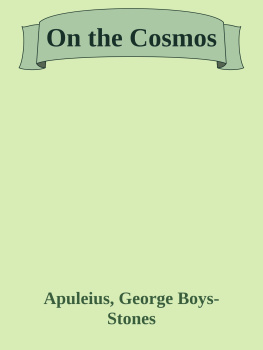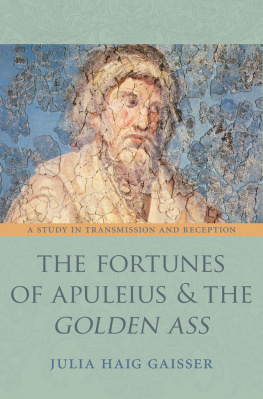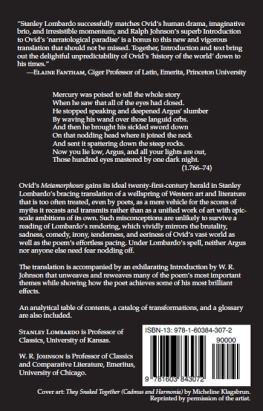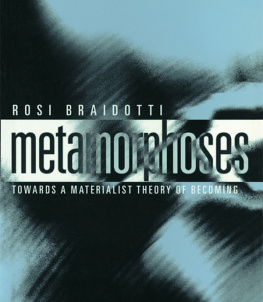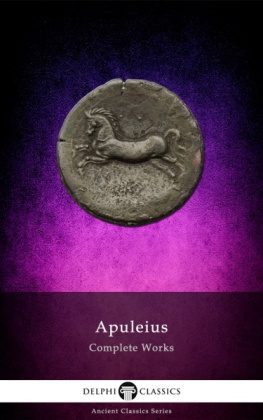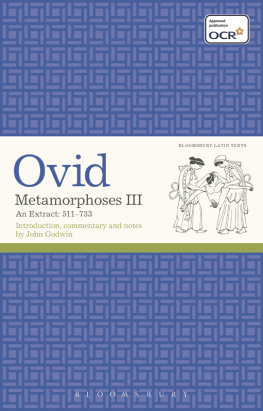Stuart R. Thomson - Selections From Apuleius Metamorphoses V
Here you can read online Stuart R. Thomson - Selections From Apuleius Metamorphoses V full text of the book (entire story) in english for free. Download pdf and epub, get meaning, cover and reviews about this ebook. year: 2019, publisher: Bloomsbury, genre: Detective and thriller. Description of the work, (preface) as well as reviews are available. Best literature library LitArk.com created for fans of good reading and offers a wide selection of genres:
Romance novel
Science fiction
Adventure
Detective
Science
History
Home and family
Prose
Art
Politics
Computer
Non-fiction
Religion
Business
Children
Humor
Choose a favorite category and find really read worthwhile books. Enjoy immersion in the world of imagination, feel the emotions of the characters or learn something new for yourself, make an fascinating discovery.
- Book:Selections From Apuleius Metamorphoses V
- Author:
- Publisher:Bloomsbury
- Genre:
- Year:2019
- Rating:3 / 5
- Favourites:Add to favourites
- Your mark:
- 60
- 1
- 2
- 3
- 4
- 5
Selections From Apuleius Metamorphoses V: summary, description and annotation
We offer to read an annotation, description, summary or preface (depends on what the author of the book "Selections From Apuleius Metamorphoses V" wrote himself). If you haven't found the necessary information about the book — write in the comments, we will try to find it.
Selections From Apuleius Metamorphoses V — read online for free the complete book (whole text) full work
Below is the text of the book, divided by pages. System saving the place of the last page read, allows you to conveniently read the book "Selections From Apuleius Metamorphoses V" online for free, without having to search again every time where you left off. Put a bookmark, and you can go to the page where you finished reading at any time.
Font size:
Interval:
Bookmark:

Metamorphoses V
The following titles are available from Bloomsbury
Selections from Apuleius Metamorphoses V: An Edition for Intermediate Students, with introduction, commentary notes and vocabulary by Stuart R. Thomson
Selections from Cicero Philippic II: An Edition for Intermediate Students, with introduction, commentary notes and vocabulary by Christopher Tanfield
Selections from Cicero Pro Milone: An Edition for Intermediate Students, with introduction by Lynn Fotheringham and commentary notes and vocabulary by Robert West
Selections from Horace Odes: An Edition for Intermediate Students, with introduction, commentary notes and vocabulary by John Godwin
Selections from Horace Satires: An Edition for Intermediate Students, with introduction, commentary notes and vocabulary by John Godwin
Selections from Ovid Amores II: An Edition for Intermediate Students, with introduction, commentary notes and vocabulary by Alfred Artley
Selections from Ovid Heroides: An Edition for Intermediate Students, with introduction, commentary notes and vocabulary by John Godwin
Selections from Propertius, Tibullus and Ovid: An Edition for Intermediate Students, with introduction, commentary notes and vocabulary by Anita Nikkanen
Selections from Tacitus Annals I: An Edition for Intermediate Students, with introduction by Roland Mayer and commentary notes and vocabulary by Katharine Radice
Selections from Tacitus Histories I: An Edition for Intermediate Students, with introduction by Ellen OGorman and commentary notes and vocabulary by Benedict Gravell
Selections from Virgil Aeneid VIII: An Edition for Intermediate Students, with introduction, commentary notes and vocabulary by Keith Maclennan
Selections from Virgil Aeneid X: An Edition for Intermediate Students, with introduction, commentary notes and vocabulary by Christopher Tanfield
Selections from Virgil Aeneid XI: An Edition for Intermediate Students, with introduction, commentary notes and vocabulary by Ashley Carter
Supplementary resources for these volumes can be found at www.bloomsbury.com/bloomsbury-classical-languages
Please type the URL into your web browser and follow the instructions to access the Companion Website. If you experience any problems, please contact Bloomsbury at contact@bloomsbury.com

The text and notes found in this volume are designed to guide any student who has mastered Latin at beginners level and wishes to read a selection of Apuleius text of the Metamorphoses in the original.
The extract chosen for this edition forms the core of the tale of Cupid and Psyche, one of the most famous stories embedded within the Metamorphoses. Apuleius is chiefly famous for being one of the great prose stylists of the Latin language: trained as an orator, educated as a philosopher, and deeply conscious of the literary heritage of the Latin language, Apuleius exuberance, playfulness and emotional effect can only be appreciated through a close reading and accurate understanding of his original language, coupled with a nuanced grasp of the tradition within which he was writing.
This edition contains a detailed introduction to the context of the Metamorphoses, supported by an in-depth examination of Apuleius literary techniques and a glossary of key terms. The introduction covers the historical and literary background to the Metamorphoses; as a second-century text written under the high empire, it is likely to be much later than any prose sixth-form students will have read before, and the introduction therefore covers key aspects of genre, literary sensibility, and intellectual and social outlook which make this text distinctively of its time.
The notes to the narrative itself focus on the harder points of grammar and word order, the rhetorical construction of Apuleius narrative, and the differences between Classical prose and Apuleius later Latin. While there is mainly a linguistic bent to the notes, there is also limited reference to the structural, rhetorical, and poetic devices of which Apuleius makes use, but these are kept to a minimum. Especially in an author as conscious of sound and style as Apuleius, it is hoped that students will soon learn to spot devices and techniques themselves. At the end of the book is a full vocabulary list for all the words contained in these sections.
There are many people without whose support this work would have not been completed, foremost amongst whom stands my wife, whose patience is truly Penelopean. I am deeply indebted to Alice Wright and her colleagues at Bloomsbury for all their help with this project. Thanks must also be expressed to the religious, royal and ancient foundation of Christs Hospital, which, more than merely supporting my work (especially in the form of its excellent Head of Classics, Ed Hatton), nurtured two of the great English Classicists whose scholarship underpins this commentary, E.J. Kenney and Stephen Harrison. I am immensely grateful to these and many others on whose shoulders I stand, and apologize for any errors or failings, which are undoubtedly my own.
Stuart R. Thomson
Eastertide 2017
The eighteenth-century historian Edward Gibbon famously designated the Roman empire of the second century AD as the period in the history of the world, during which the condition of the human race was most happy and prosperous. Without uncritically accepting Gibbons judgement, it was certainly into a peaceful, prosperous North Africa under Roman rule that Apuleius was born, sometime in the 120s. In that cosmopolitan empire, he carved out a career for himself as a celebrated writer, orator, Platonic philosopher and professional intellectual.
What information we have of his life comes from his own works, and from comments by St Augustine of Hippo, a fellow North African writer clearly familiar with the writings of Apuleius several centuries later. He was born into a wealthy provincial family in a city (colonia) called Madauros in the province of Africa Proconsularis (now Mdaurouch in modern-day Algeria), several hundred kilometres inland of Carthage (modern Tunis); his father achieved the highest political office in the colonia and left Apuleius and his brother a sizeable fortune at his death.
Although there had been Roman influence in this part of North Africa since the days of Massinissa, ally of the great Roman general Scipio in the Second Punic War (late third century BC), Punic culture and language (that is, the language and culture of Carthage) remained strong, and it is not unlikely that the first language Apuleius spoke was Punic, rather than Latin, as was the case with Apuleius own stepson Pudens (Apol. 98), and, a generation later, the North African-born emperor, Septimius Severus.
It is Apuleius facility with and mastery of the language of Rome which made his career, however, and his Latin literary education would have begun in Madauros, where the empire had made its language the standard for the literary and legal worlds. For more serious education he was sent to Carthage, learning grammar and rhetoric, and probably also developing a grounding in Platonic philosophy. From there his studies took him further afield, to Athens, where his studies in Greek (started in Carthage) were perfected, and then later to Rome, and there is some likelihood that he also travelled to other centres of imperial intellectual life such as Smyrna, Pergamum and Ephesus; he undoubtedly had contact with the major intellectuals and writers of his time at these hubs of culture and learning. This kind of wide educational travelling among the literary elite was not uncommon in the empire his contemporary Aulus Gellius studied and lived in Athens, and similar educational journeys are recorded by the Greek sophist Lucian and the second-century Alexandrian Christian author Clement.
Next pageFont size:
Interval:
Bookmark:
Similar books «Selections From Apuleius Metamorphoses V»
Look at similar books to Selections From Apuleius Metamorphoses V. We have selected literature similar in name and meaning in the hope of providing readers with more options to find new, interesting, not yet read works.
Discussion, reviews of the book Selections From Apuleius Metamorphoses V and just readers' own opinions. Leave your comments, write what you think about the work, its meaning or the main characters. Specify what exactly you liked and what you didn't like, and why you think so.

